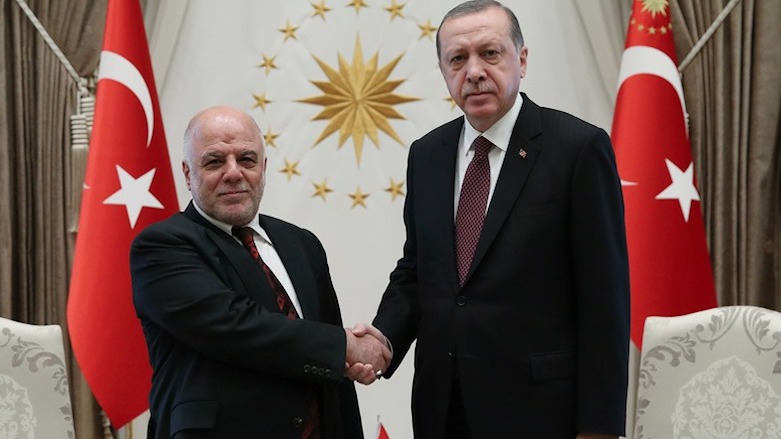Ankara, Baghdad vow cooperation against Kurds

ERBIL, Kurdistan Region (Kurdistan 24) – During a trip to Ankara on Wednesday, Iraq’s Prime Minister Haider al-Abadi received full support from his Turkish counterpart Binali Yildirim, and President Recep Tayyip Erdogan, for his government to counter the Kurdistan Region’s aspirations for independence.
Abadi first met with Erdogan who said the trio of Turkey, Iran, and Iraq had come to a common point in imposing economic sanctions and engaging in military action against Kurdistan which last month held a referendum on statehood opposed by the three countries and the Kurds’ Western allies.
Of the voters, 92.7 percent approved Kurdistan’s independence from Iraq on Sep. 25, giving the Kurdish leadership a mandate to conduct negotiations with Abadi’s government for an amicable separation.
The Iraqi PM praised militia fighters in the ranks of the Iranian-backed Hashd al-Shaabi who along with the army pushed an offensive last week on the Kurdish-majority city of Kirkuk, and managed to capture it due to Kurdish political and military discord.

Erdogan, on his part, fell short of mentioning the Shia militia which he previously labeled a terror group for the crimes committed against Iraqi Sunnis during the ongoing war against the Islamic State (IS).
He vowed closer cooperation with Baghdad against the Kurdistan Workers’ Party’s (PKK) presence in the Yezidi (Ezidi) town of Sinjar (Shingal) and Qandil mountains straddling along the Iraq-Iran border.
“We, as Turkey, are ready to continue our shared struggle,” he said, though Abadi did not speak of the PKK which leads a guerrilla fight against Turkish troops over Kurdish rights.
Erdogan promised to strengthen ties with Abadi’s government. The two sides were pronouncedly at odds before Kurdistan’s vote over Turkish military presence in Iraq and Ankara’s pro-Sunni regional policy.
He also expressed readiness to allow Iraqi oil pass through his country’s territory and help Baghdad impose its authority over border crossings in a bid to bypass Kurdistan, state media reported.
Both leaders also attended a meeting of their high-level delegations joined by ministers and Erdogan’s spy chief Hakan Fidan.

Later, sitting down with Yildirim, Abadi thanked Turkey for its support against Erbil. Ankara fears Kurdistan’s independence will embolden its some 20 million strong restive Kurdish population in demanding self-rule and constitutional recognition.
“Those trying to destroy the region [Middle East] could not realize their goal,” Abadi said, without elaboration.
Yildirim emphasized that the three capitals of Baghdad, Ankara, and Tehran blocked Kurdistan’s independence and they were also intent on protecting the territorial integrity of Syria where the US-backed Kurds have carved a de facto autonomous region.
Similar to Erdogan’s remarks, he promised support to deny the Kurds the control of the vital border crossing of Ibrahim Khalil, or Khabour as known in Turkey.
“We have without hesitation stood by and will stand by Iraq against the smallest development that could violate the Iraqi unity,” Yildirim said.
Editing by Karzan Sulaivany
